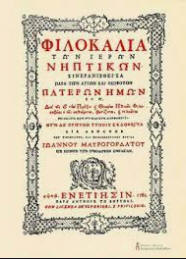|
1. People are generally called intelligent through a wrong use
of this word. The intelligent are not those who have studied the
sayings and writings of the wise men of old, but those whose
soul is intelligent, who can judge what is good and what evil;
they avoid what is evil and harms the soul and intelligently
care for and practice what is good and profits the soul, greatly
thanking God. It is these alone who should properly be called
intelligent.
2. A truly intelligent man has only one care-wholeheartedly to
obey Almighty God and to please Him. The one and only thing he
teaches his soul is how best to do things agreeable to God,
thanking Him for His merciful Providence in whatever may happen
in his life. For just as it would be unseemly not to thank
physicians for curing our body, even when they give us bitter
and unpleasant remedies, so too would it be to remain ungrateful
to God for things that appear to us painful, failing to
understand that everything happens through His Providence for
our good. In this understanding and this faith in God
lie salvation and peace of soul.
3. Restraint, meekness,
chastity, steadfastness, patience, and similar great virtues are
given us by God for weapons to resist and oppose the
tribulations we meet with, and to help us when they occur. So if
we train ourselves in the use of these powers and keep them
always ready, then nothing that may befall us will ever be hard,
grievous, destructive, or unbearable, for all would be overcome
by the virtues we possess. Those whose soul is not intelligent
never think of this, for they do not believe that all happens
for our good, in order that our virtues should shine forth and
that we should be crowned by God for them.
4. If you
consider riches and their full enjoyment to be merely a
short-lived illusory vanity, if you know that a virtuous life
pleasing to God is better than riches, you will hold fast to
this conviction and keep it in memory; then you will not sigh,
complain or reproach anyone, but will thank God for everything,
when you see that men worse than you are praised for eloquence
or erudition and wealth. Insatiable desire of riches and
pleasures, love of fame and vainglory, coupled with ignorance of
truth, are the worst passions of the soul.
5. When an
intelligent man examines himself he sees what he should do and
what is useful to him, what is akin to his soul and leads to
salvation, and what is foreign and leads to perdition. In this
way he avoids what harms the soul, as something foreign to it.
6. The more a man uses moderation in his life, the more he
is at peace, for he is not full of cares for many
things-servants, hired laborers and acquisition of cattle. But
when we cling to such things, we become liable to vexations
arising from them and are led to murmur against God. Thus our
self-willed desire (for many things) fills us with turmoil and
we wander in the darkness of a sinful life, not knowing
ourselves.
7. We should say not that it is impossible for
a man to lead a virtuous life, but that it is not easy. Indeed,
it is not attainable for everyone in equal measure, for only
those attain to virtuous life who are devout and who have a
God-loving mind. The ordinary mind is worldly and unstable; it
produces both good and bad thoughts, is changeable, and leans
towards material things. But a God-loving mind is an executioner
of the evil which comes to men as a result of their self-willed
carelessness.


Source:
Excerpted Texts on Saintly Life by SAINT ANTHONY THE GREAT (250-350
AD)
From: ‘EARLY FATHERS from the PHILOKALIA’, Faber and Faber,
London, translated from the Russian by E. Kadloubovsky and
G.E.H. Palmer
|


